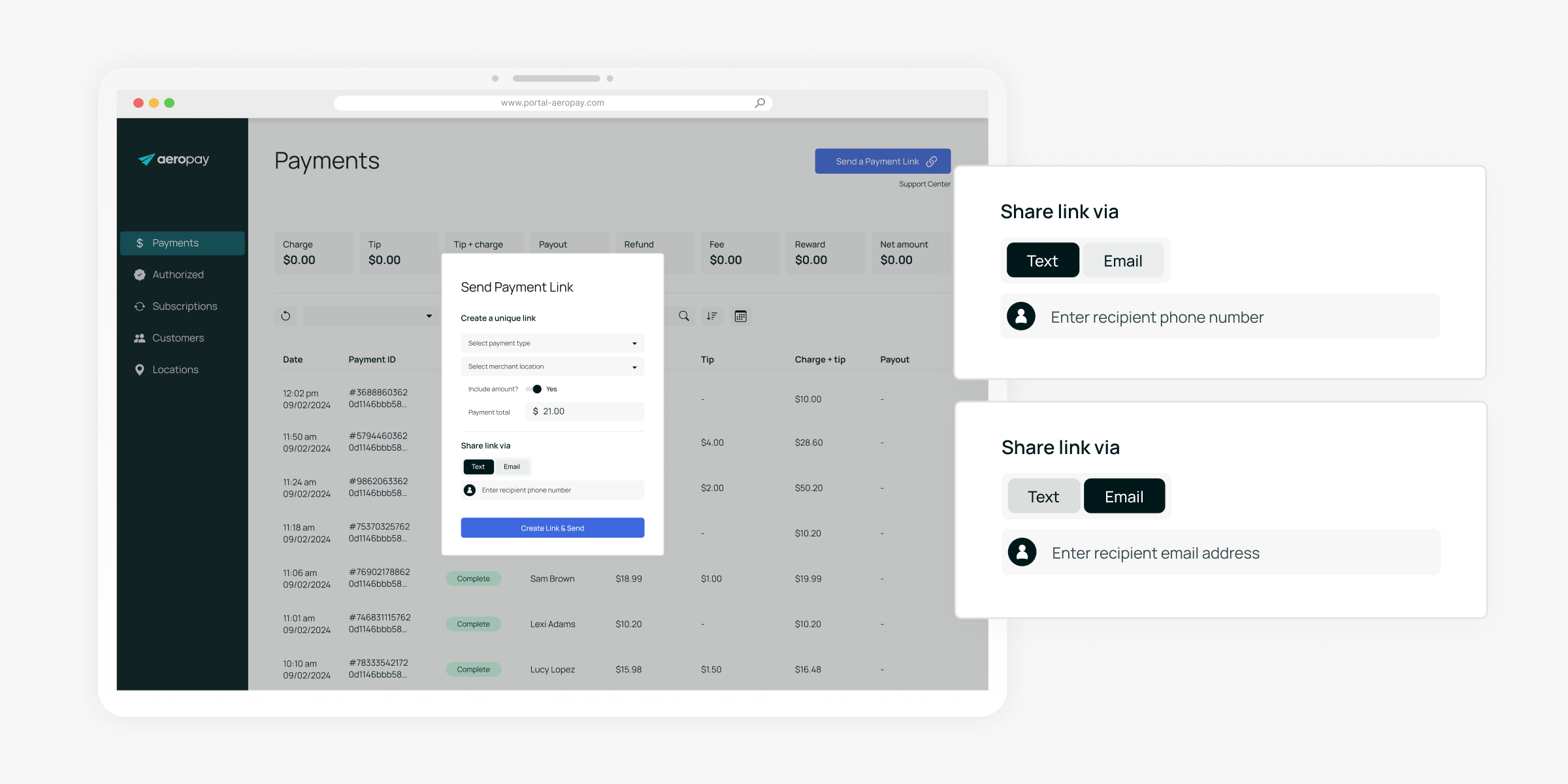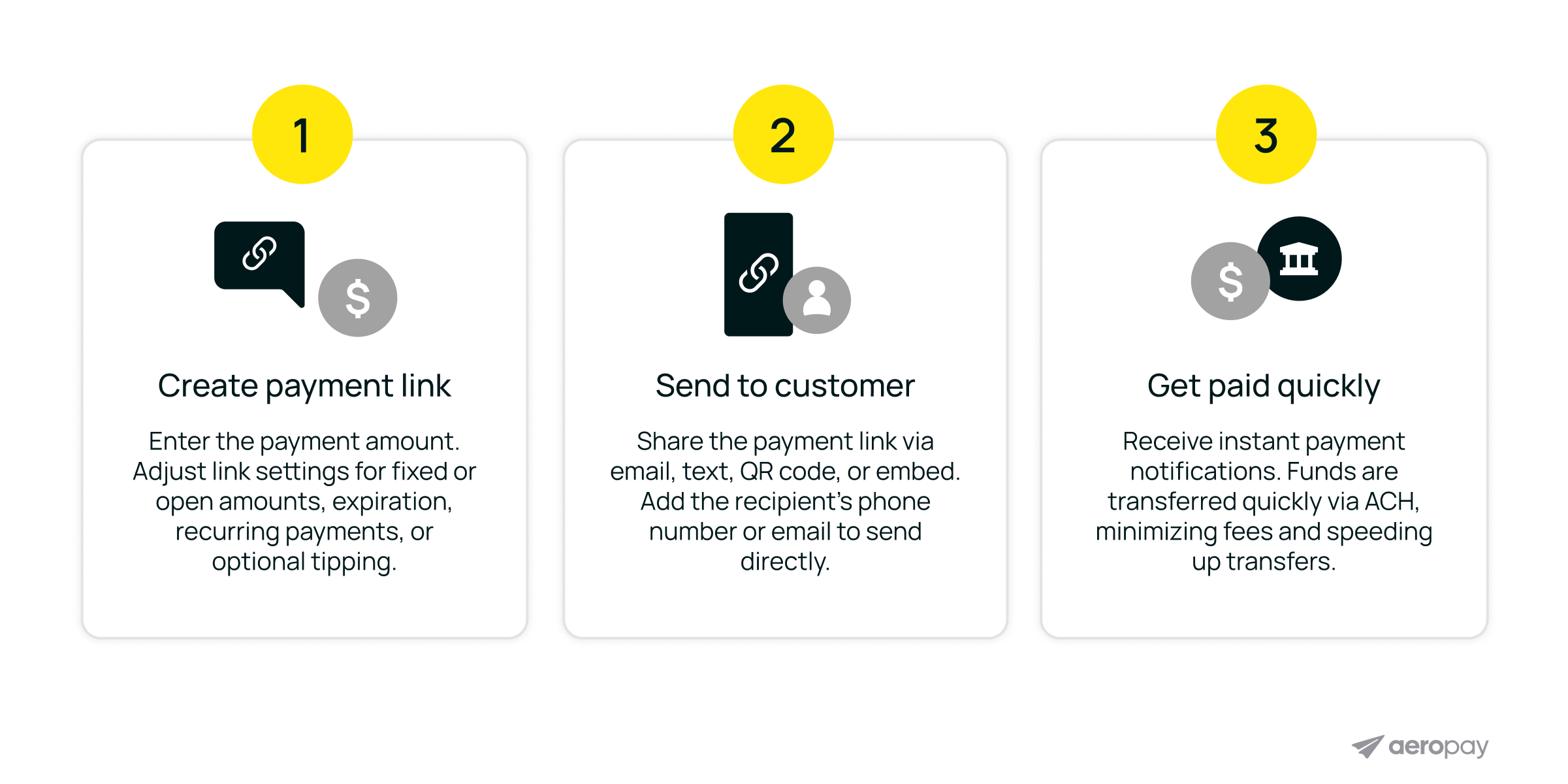What are payment links? A guide for businesses


Payment links make it easy for businesses to collect money from anyone, anywhere by sending them a unique web-based payment page for checkout.
____________________
Payment links (aka “pay by link”) are one of the most straightforward ways to collect money digitally.
This online payments tool makes receiving funds easy for customers, and affordable for merchants.
For business owners who typically take payment via cash, check, or physical cards—payment links remove the overhead and complication of traditional payment processing.
The result is a direct connection between business and customer that makes collecting payments seamless and simple.
This post explains exactly what payment links are, why they’re important, and the best solution to add at your business.
A payment link is a custom URL that’s generated by a business and sent electronically (usually by text or email) to request payment from a customer.
When the customer clicks the link, they’re directed to a secure payment gateway, or checkout page, where they enter payment details and complete the transaction.
Payment links come with tons of flexibility. They can be used for a single customer’s one-time payment, customized to allow for recurring ACH payments, or automated to send on a regular schedule or following a specific action.
.png)
Before we get too far, it’s important to call out the key differences between payment link providers.
The type(s) of payment method included in a link vary depending on the provider, but one solution is far more affordable and direct.
Let’s look at two types of payment links:
Most payment link providers fall into this category. They function as any payment link does — enabling businesses to send customers a link for payment — but they focus on card payments (debit card / credit card) as well as wallets like Google Pay, or Apple Pay at checkout.
These card-based payment links come with high fees. And can take days to process.
For example, Square, Stripe, and Shopify all charge fees greater than 2.5% + $0.50 for each card transaction.
That’s $3 lost for every $100 earned. And that cost is even more impactful for large sum transactions; costing you $63 on a single $2500 transaction.
Pay by bank is an emerging solution that makes it easy for consumers to pay with their bank account. Payment links configured for pay by bank empower business owners to effectively accept these low-cost, highly secure transactions.
When compared with card-based payment links, the key benefits of pay by bank payment links are:
Direct bank-to-bank transfers eliminate the need for intermediaries like card networks and payment processors, speeding up the payment process.
Passwordless authentication verifies a user in seconds using their device's face or touch ID.
Account-to-account payment links use Automated Clearing House (ACH) transfers instead of card networks to move funds.
This means when a customer pays via A2A link, you avoid interchange fees and reduce payment processing costs up to 72%.
US merchants already paid $101 billion in Visa and MasterCard credit card processing fees, including $72 billion in interchange fees just last year. This is easily avoided with direct A2A solutions.
Open banking payments ensure transparent data control between financial institutions, merchants, and third-parties. Merchants can access real-time bank account data directly from consumers’ banks, which enhances the authentication process and reduces the risk of fraud.
Businesses are also able to easily verify account information, such as account balance, which ensures funds are available before completing a transaction.
At the same time, merchants can set up effective processes to limit fraudulent transactions, alongside typical processor risk mitigation practices like bank-level authentication and multi-factor authentication (MFA).
Open banking solutions like Aeropay leverage a smart fraud engine that is selective about what transactions get let through, while still maintaining a high acceptance rate.
Traditional cards expire every three years on average. And many consumers lose or replace them even sooner.
On the other hand, US adults use the same primary checking account for more than 17 years on average.
A2A payments providers like Aeropay allow businesses to enable guaranteed ACH for payments, effectively shouldering the risk of chargebacks or declines, and guaranteeing funds will be delivered.
Guaranteed ACH means your payments are delivered on time, every time — with no risk of returned or unprocessed payments.
Get an inside look at pay by bank approval rates.
.png)
There are seemingly infinite use cases for pay links. But the most effective payment link business models include:
Brick and mortar shops can easily generate and send payment links to their customers. They can also configure QR codes in-store for payment.
This is an effective way to enable pay-by-bank for in-store shopping — lowering the barrier to entry for associated processing fees in a convenient workflow.
Accountants, lawyers, consultants, housekeeping, maintenance and other professionals can simplify their service-based transactions with payment links. By generating and sending a one-time (or recurring) payment link, clients can easily complete a transaction.
Additionally, you can guarantee payment for your services with Aeropay’s guaranteed ACH protection.
Gyms, yoga studios, massage therapists, or personal trainers use payment links to simplify payment collection. Instead of relying on the cumbersome hardware that comes with physically processing payments, customers just click a link to pay.
Organized events like conferences, fundraisers, workshops, or classes use payment links to simplify registration and payment collection. Attendees can click a link to register and pay in one seamless process.
E-commerce businesses, particularly those that offer subscription services, benefit from payment links by offering customers a way to pay without the need for an account or complex checkout processes. Recurring payment links can also be used for subscriptions, automating payments at regular intervals.
Payment links simplify rent collection by allowing landlords and property managers to request payments directly from tenants without relying on checks or complicated third-party platforms. A single link can be sent each month, or recurring payment links can automate the process for tenants.
Payment links let you accept ACH payments wherever you sell. It’s a simple, secure, and affordable solution.
Here are the specific benefits that businesses using pay by link see:
Payment links don’t require hardware to collect payment from your customers, reducing overhead and eliminating the need for point of sale (POS) tools like card readers and registers. All you need is a computer or mobile device to send and process payments and payouts.
Build a flexible payment experience by sending requests for payment based on customer preferences. Share payment links via text, email, social media, or QR code.
You can also customize the design of your link pages to include custom branding, tip functionality, recurring debits, one-click checkouts and more.
By implementing and embedding payment links for checkouts, businesses increase speed to payment. Aeropay data found the average payment link is paid within 2.5 minutes after being sent.
Your customers crave simplicity and security when it comes to sending payments. Links are straightforward and digital so any customer can send you funds, from anywhere.

A payment link is incredibly flexible, so you can use them in whatever way best suits your business.
The most common ways to capture funds with payment links are:
Text payment requests deliver a unique URL directly to your customer’s phone via SMS. The request includes the link to view payment details and check out as well as a short, custom message.
Useful for: Fulfilling online orders or requesting payment for a service.
An email payment link contains order details, custom messaging, and a call to action (CTA) to check out. These URLs are delivered securely from one email to another.
Useful for: B2B invoicing, events, or collecting payment without a phone number.
Social media payment links allow business owners to collect payment directly from Instagram, Twitter, TikTok, Pinterest, or Facebook. Either post the link directly to your page to start accepting payments, add a button to your profile, or reach a new audience using targeted ads with embedded links for payment.
Useful for: Small businesses, influencers, fundraisers, and more.
.png)
Collect in-person payments by generating a QR code that customers can scan to open the payment link. Enable instant access to payment collection from any customer's mobile device.
Useful for: Farmer’s markets, retailers, restaurants, and more.
Businesses have the option to create payment links that allow customer consent for automated debits to their account. This is especially useful for offerings that require regular (often monthly) payments.
Useful for: Memberships, subscriptions, and rent payments.
Programmatic payment links allow businesses to automate and scale their payment processes using APIs.
By integrating with a service provider like Aeropay, you can dynamically embed and generate payment links for a variety of use cases — like marketing campaigns, sales automation, online transactions, or streamlined payment collection.
This process eliminates the need for manually creating individual links, making it ideal for operations at scale.
Useful for: Automatically sending a payment link after a customer action like placing an online food order.
The reason payment links are popular is they’re very easy to configure and implement. They also improve payment optimization at your business.
Here’s how to set up and send a payment link:

Using a product like Aero Payment Links, input the payment amount due for your service, product, donation or subscription. Keep the experience cohesive by adding brand colors and a logo to your links.
Additional link customizations to consider:
Add the phone number or email address of your link recipient. Alternatively, you can copy/paste, embed, or generate a QR code to distribute your payment link.
Receive a notification of payment and access your funds instantly from your business bank account. Money is transferred over ACH rails — keeping costs low and expediting transfer speed.
Payment links are typically a free product to use (although some providers charge monthly fees), but any associated merchant costs come from processing fees. These fees generally depend on your chosen method of payment collection.
Here’s a breakdown of average fees per transaction by method of payment when a customer pays by link:
.png)
The reality is, many payment link providers charge high processing fees. The best way to lower those costs is choosing a provider that specializes in pay by bank.
Discover the most affordable, effective payment links available.
Aeropay’s account-to-account payment links allow your customers to pay by bank — saving you 72% on processing fees (compared with cards).
Start customizing, configuring, and collecting with payment links today.
Contact sales to learn more and get started.